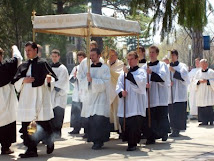Nouwen expresses the necessity of solitude in order to increase ones depth and understanding of their spirituality, Aschenbrenner completes this undertaking in a realistic aspect for all variations of ministry. Nouwen preferred the utilization of a monk to “paint the picture” of necessity of solitude, which for the most part, excluded those who serve in different capacities of the church or various organizations.
Solitude as time spent alone with God and with oneself will always, sooner or later, test our sense of self and experiment with the central depth of our person. Solitude plays an essential role in moving beyond the levels of busy activity and superficial spontaneity. Time alone, if more than just a few minutes and if perdured in, can reveal inner chambers of the heart concealed within the frustration of unproductive inactivity and the spontaneity of thought and feeling in our consciousness. In these quiet times alone, if regularly planned and not just fitted to our moods and feelings, we can break through to a new level of experience and relationship with ourselves and with God (Aschenbrenner, S.J., 1995, 244). Various methods of self-reflection can also assist this movement to the center. Consciousness examine, journal writing, spiritual direction are just some examples of interiority, of a regular reflection that helps us to search for—and to receive—something underneath the busy flow of activity and superficial spontaneous fluctuation in our consciousness. Specific life experiences often invite that second look of reflection and thus have the potential for calling us deeper into ourselves (Aschenbrenner, S.J., 1995, 245).
It is easy to lose belief in God’s love simply because I don’t feel it anymore. For one living on the skin of the soul, the felt experience in itself unreflectively becomes ultimate legitimation of the presence or absence of one’s faith. But the reality is otherwise: we must learn to recognize the loving hand of God, at times dulling our sensuous, felt experience of love, precisely as an invitation to believe in a love far beyond what we feel (Aschenbrenner, S.J., 1995, 245).
This process of personal development and ministerial maturing into the core of ourselves obviously happens over years. And, we need help with such formation of self, today especially, because of some of the secular forces of our world mentioned earlier. The importance and difficulty of this kind of mature faith development poses some serious questions for programs of religious formation that prepare for permanent vocational choice and ministry (Aschenfrenner, S.J., 1995, 246).
Those who are in some type of ministry need to understand and develop within themselves this core, this closeness with God, their identity within their spirituality. Often, we forget that we “serve” the people of God in our various capacities as ministers; pastoral counselors; ordained or within the laity. It (our service) becomes “mundane” or “unfulfilling” for some reason (lack of understanding, spirituality). We need to work prayerfully for our ministry, and prayerfully for God.
Reference:
Aschenbrenner, G. S.J. (1995). A Hidden Self Grown Strong. In R. J. Wicks (Ed.), Handbook of Spirituality for Ministers (pp. 228-249). New York: Paulist Press.
Christian Education
"Since all Christians have become by rebirth of water and the Holy Spirit a new creature(8) so that they should be called and should be children of God, they have a right to a Christian education. A Christian education does not merely strive for the maturing of a human person as just now described, but has as its principal purpose this goal: that the baptized, while they are gradually introduced the knowledge of the mystery of salvation, become ever more aware of the gift of Faith they have received, and that they learn in addition how to worship God the Father in spirit and truth (cf. John 4:23) especially in liturgical action, and be conformed in their personal lives according to the new man created in justice and holiness of truth (Eph. 4:22-24); also that they develop into perfect manhood, to the mature measure of the fullness of Christ (cf. Eph. 4:13) and strive for the growth of the Mystical Body; moreover, that aware of their calling, they learn not only how to bear witness to the hope that is in them (cf. Peter 3:15) but also how to help in the Christian formation of the world that takes place when natural powers viewed in the full consideration of man redeemed by Christ contribute to the good of the whole society.(9) Wherefore this sacred synod recalls to pastors of souls their most serious obligation to see to it that all the faithful, but especially the youth who are the hope of the Church, enjoy this Christian education."
Gravissimum Educationis
Gravissimum Educationis
Saturday, March 21, 2009
Subscribe to:
Post Comments (Atom)




































No comments:
Post a Comment